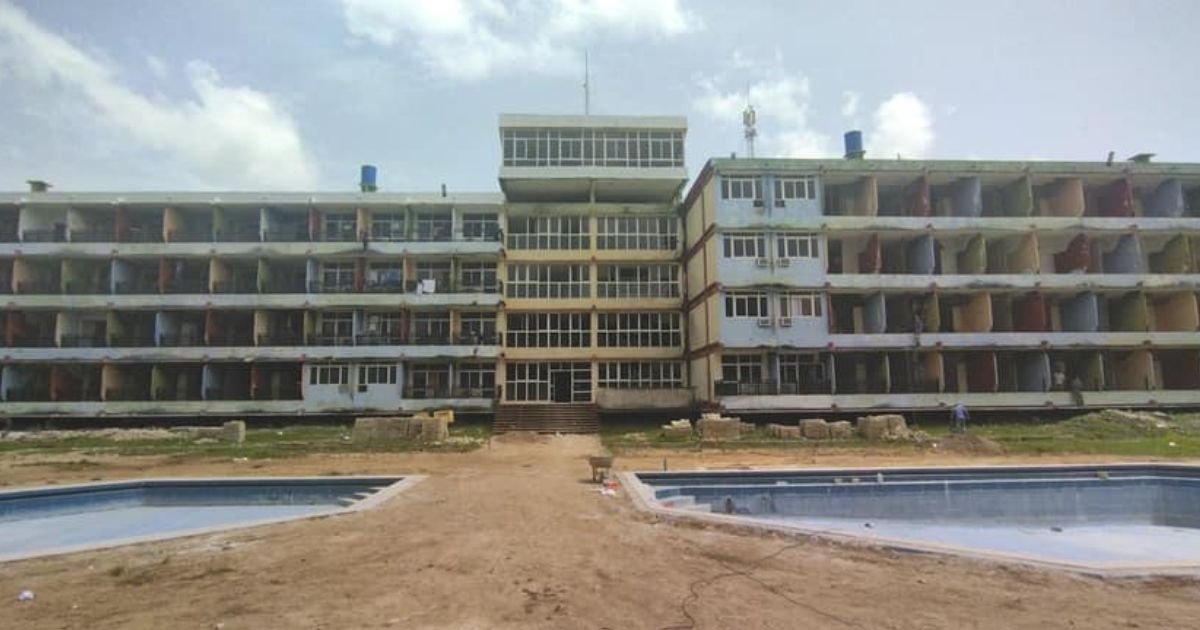
Related videos:
The Cuban regime has been failing to fulfill its housing construction plan for years, yet it has not wavered in building and renovating hotels, despite their low occupancy, particularly during dates that the government considers significant, such as July 26.
On the occasion of the so-called "National Rebellion Day," which this year the government has designated for the province of Sancti Spíritus, the repair of the Zaza hotel is being expedited, which state-run media has portrayed as the largest construction intervention ever carried out at the venue.
Mayumi Funcia, head of the Engineering and Design Department at the Emprestur Varadero branch, who is overseeing the construction work, informed the state-run Radio Sancti Spíritus that the first stage of the intervention involves completing nearly 60 of the 124 rooms, as well as the pool and its areas, the lookout bar, the lobby bar, and the game room, among other spaces.
The restaurant, the perimeter fence, and the Media Luna pavilion at the entrance of the facility will also be restored.
He pointed out that, although the task of repairing the hotel inaugurated in 1976 is "monumental," they have undertaken it "with a lot of love and professionalism," highlighting the regime's willingness to invest more in the decaying tourist infrastructure than in other sectors such as education and health.
According to Funcia, the plan is to reconstruct a water mirror at the entrance that led to a waterfall, along with the green area. Additionally, they noted that they will maintain the classic prefabricated system while adding “a touch of modernity.”
To tackle the "monumental" task and meet the deadline of July 26, the management explained that they have called upon several companies and there are also workers from at least five provinces in the country.
"All efforts today from the Ministry of Tourism are focused on the Zaza hotel because this is the project prioritized by the country, as the governor of the province and our minister have informed us," he stated.
He also emphasized that so far the most challenging aspect has been purchasing the equipment for modernizing the pool, which they intend to equip with “the necessary technology for water recirculation, among other international standards,” hinting that the facility will welcome tourists from other countries.
However, he clarified that the hotel "will have a category very close to three stars" and expressed regret that the Zaza is currently undervalued. Although he did not specify the reasons, he stated that the neglect of the facility is the regime's responsibility.
In that regard, Nedelvis Rodríguez Companioni, the commercial deputy director of the Islazul Sancti Spíritus branch, which is responsible for the management of Zaza, explained that the hotel served as an isolation center during the early stages of the pandemic but closed its doors just a few months later due to the undeniable deterioration of its facilities.
Additionally, the official acknowledged that during the five years since the hotel has been closed, there has been a delay in executing the investments that were approved for the Zaza at that time, and the few proposals that were made came to a standstill.
The official justified the government’s inaction by pointing out, without specifying, other culprits: “Yes, there was interest from Islazul Sancti Spíritus, but it was not up to us.”
Laura Mármol Hernández, who has been managing the hotel for just a month, stated that the goal is to elevate the two-star establishment, which it has always held, to three stars through a reclassification process.
The official Radio Sancti Spíritus highlighted the repair of the hotel as an achievement of the regime in that province, emphasizing especially the speed at which the work is being carried out, claiming that the facility will be ready in the coming days before July 26.
The Cuban government recently announced the revival of the DiTú café network, famous in the early to mid-2000s, which is mostly out of use today.
The announcement was presented as an effort "to strengthen tourism in Cuba," reported the state-run Prensa Latina.
However, although the return of these cafes aims to enhance the inadequate tourist offerings in Cuba, it has frequently been the subject of criticism.
Currently, the so-called Ditú stand out in the lives of Cubans due to their limited availability, which is often sold at very high prices.
Filed under: